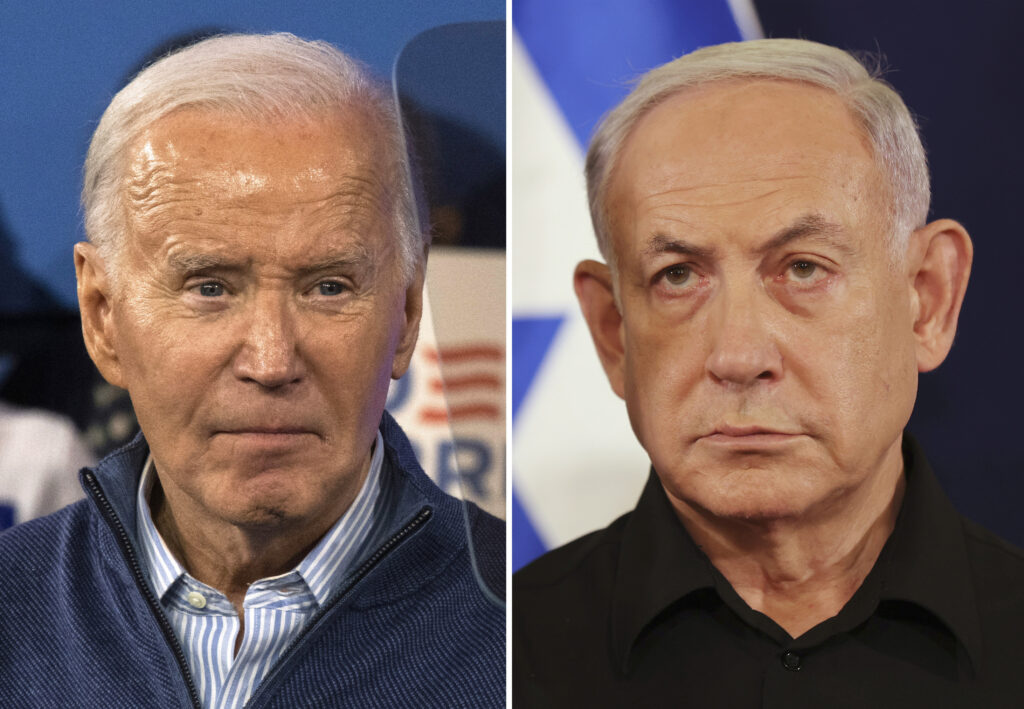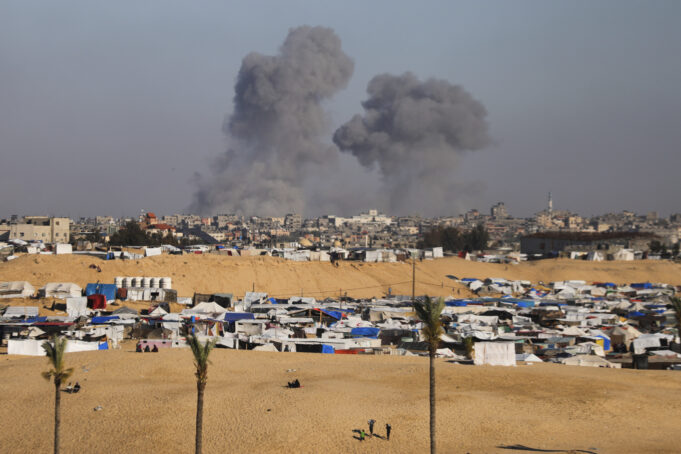President Joe Biden warned that America will not ship a load of heavy bombs to the Zionist State of Israel out of concern they will be used in Israel’s planned assault on Rafah, a location sheltering 1.5 million Palestinians who survived deadly bombardment in other parts of the Gaza Strip.
After the warning, at presstime, thousands of Palestinians were fleeing Rafah as Israel bombed the eastern section of the city. Residents said an Israeli attack near a mosque killed at least three people and wounded others in the eastern Brazil neighborhood, reported Reuters.
Being the main patron of arms and money to Israel, much of the arsenal causing blood and destruction is stamped “made in America.” In a televised interview, President Biden acknowledged U.S. complicity as the supplier of the weaponry in the seven-month-old war that has surpassed 35,000 Palestinian deaths.

“Civilians have been killed in Gaza as a consequence of those bombs and other ways in which they go after population centers,” the president told CNN on May 8, referring to 2,000-pound bombs previously shipped to Israel.
“If they go into Rafah, I’m not going to be supplying the weapons that have been used historically to deal with Rafah, to deal with the cities, to deal with that problem,” he said.
He also threatened to withhold further arms supplies if a major ground invasion occurred. However, defensive weapons, such as ammunition for Israel’s U.S.-supplied Iron Dome anti-missile system, would continue flowing.
In a May 9 statement, Israeli Prime Minister Benjamin Netanyahu shoved back on the warning.
“If we need to stand alone, we will stand alone,” said Mr. Netanyahu.
“If necessary, we will fight with our fingernails. But we have much more than fingernails,” he defiantly retorted.
For some observers, withholding bombs sounds principled and perhaps like a “come to Jesus” moment for America, which is under intense fire for its “ironclad support” of Israel, despite documented war crimes, international and humanitarian law infractions, and charges of genocide.
They argue the move for America, whose hands are not clean in the war, is actually disingenuous and duplicitous. Mr. Biden’s no—for now—on sending the bombs was said with the cautious soft shoe refrain assuring Israel that America’s “ironclad” commitment to its security goes unchanged. Time will tell if the threat is another symbol lacking substance.
Dr. Harry Singleton, professor of African American Studies and Religious Studies at the University of South Carolina, lambasted the Biden administration’s hypocrisy of criticizing Israel on the one hand yet signing multiple billions of dollars in taxpayer checks to Israel on the other hand.
“Rather than providing the kind of leadership that America claims she is … the leader of the free world and its president telling Netanyahu to stop in his genocide,” Dr. Singleton argues, “he’s actually sending him more money to carry out that plan, which serves as even more of an incentive for Netanyahu to continue in his ways against Palestinians.”
Israel has been the largest recipient of U.S. foreign aid since its founding, receiving about $300 billion (adjusted for inflation) in total economic and military assistance. The United States provisionally agreed to provide Israel with nearly $4 billion annually through 2028, according to the Council on Foreign Relations.
The Biden administration caught the ire of critics for pushing U.S. lawmakers to expedite massive arms transfers to Israel despite the overt threats on Rafah. Only recently has Washington shown any sign of conditioning aid on commitments with the threat to delay military munitions. But is it too little, too late?

The Biden administration lacks hutzpah to stand up to Mr. Netanyahu
In a message earlier this year, the Honorable Minister Louis Farrakhan, National Representative of the Nation of Islam and the Most Honorable Elijah Muhammad, said there is a record of U.S. leaders capitulating to Zionist power, which describes the current situation, including Rafah, as part of a wider agenda involving the region that must be noted.
“Prime Minister Netanyahu has a vision of Haaretz Israil. Several states over there, including Saudi Arabia, Jordan, they intend to annex that to what is called ‘Greater Israel,’ the Minister said during his Saviours’ Day message entitled “What Does Allah The Great Mahdi And The Great Messiah Have To Say About The War In The Middle East?” on Feb. 25.
“Do you know about that? That man already has over 400 nuclear bombs sitting in the desert in Dimona, Israel,” the Minister continued.
“That’s a lot of weapons. And they, now, feel that they are the power in the Middle East, and they are. They feel that they can manipulate America, because they don’t respect Joe Biden. And they have not respected any American president; in the last 40 years, they have manipulated every president of the United States of America,” explained Minister Farrakhan.
Through U.S. interest groups like the Anti-Defamation League, American presidents are “literally handcuffed” he said.
Reflecting on President Biden’s trip to Israel right after the Oct. 7 attack that jumpstarted the war, and his demeanor toward Mr. Netanyahu, Minister Farrakhan observed weakness.
“Mr. Biden should be ashamed of himself, being the leader of a country that is reputed to be ‘the most powerful nation on the Earth,’ and he is in Israel bowing to Netanyahu. And I mean bowing,” observed the Minister. “And they tell him that they are not going to stop the war,” reflected the Muslim leader.
“They said they have to destroy Rafah because that is where the break started with Hamas, through Rafah, through the southern part of Gaza. So now they have to ‘get even,’ so they say: ‘No, no, no! We’ll fight,’” said Minister Farrakhan.
Other observers like investigative journalist and activist Eugene Puryear see President Biden’s decision on the bomb shipment as a politically motivated response to public backlash and poll number concerns in a re-election season.
“I think what is motivating Biden is very much the domestic political scene,” said Mr. Puryear. “He’s in a situation where the vast majority of his own party, roughly 75 percent, think there should be an immediate ceasefire,” he said.
Additionally, among Black people and younger people whom the president perceives as his core base, “there is very little appetite for increased military aid to Israel,” a “significant desire for a ceasefire,” and “greater support for the Palestinians,” said Mr. Puryear.
President Biden has verbalized his desire for Black support, claiming the Black community supports him. But polls tell a different story, said Mr. Puryear, citing a poll from The Economist YouGov.
“What you’ll notice is one of the questions they always ask is, are you more sympathetic to the Israelis? Are you more sympathetic to the Palestinians? Amongst African American population, sympathy for the Palestinians is always higher,” Mr. Puryear points out.
“So, I think from Biden’s perspective, he has been so lockstep in support of the genocide, and it’s become so just mind-boggling to so many people, the levels of depravity and brutality that is reached, I think he has to start making moves that will protect him domestically,” said the activist.

In addition, he said Mr. Biden faces a problem in the international arena too. Essentially every country on the globe believes there should be a ceasefire, except for a handful of U.S. puppets, and some European countries. But the vast majority of public opinion in those countries that Biden is looking to sway are 100 percent in support of the Palestinians, and certainly want a permanent ceasefire.
Even a close U.S. ally like Saudi Arabia finds a significant percentage of Saudis support Hamas. “How long can you continue this war with U.S. complicity, before it starts to hurt even your closest friends and allies?” said Mr. Puryear.
Pressure is mounting as mass demonstrations and pro-Palestinian protests at U.S. campuses against Israel and American policy are spreading internationally. Colleges and universities in Amsterdam, France, the United Kingdom, India, Lebanon, Australia, Canada, Spain, Japan, Türkiye, Ireland, and Mexico are experiencing solidarity protests.
“It shows that Generation X does have a liberating conscience and that it recognizes the power of protest in what is clearly a genocidal situation in the West Bank and Gaza at this moment,” said Dr. Singleton.
Cairo negotiations
Meanwhile, diplomatic talks in Cairo, Egypt underway involving Qatar, Egypt, and the United States broke down without a deal. At first, when news broke that Hamas had accepted a ceasefire proposal from the talks there was hope and Palestinians were dancing in the rubble-filled streets of Gaza.
But hope was dashed as fast as it came when Israel rejected the agreement. To the Palestinians, this meant continued genocide, destruction and ethnic cleansing.
Despite the breakthrough and possible path to halting war, and bloodshed, and relieving a deadly humanitarian crisis, Israel did what it consistently does when a ceasefire is called through United Nations resolutions or diplomatic talks like in Cairo; they ignore it.
While Israeli representatives reiterated objections to a ceasefire, Mr. Netanyahu doubled down on threats against Rafah, warning the army is on the way.
“I have ordered our delegation that went to Cairo to continue to insist on our demand to guarantee our security,” Mr. Netanyahu said in video remarks on May 7. “In parallel we will continue our war against Hamas. Our entry into Rafah is a very important step. Our army is on its way to destroy the remainder of their capabilities,” he said.
However, Mr. Netanyahu’s words about destroying “their capabilities” also mean erasing the displaced Palestinians. The planned offensive has been an object of widespread condemnation by Israel’s foes and allies alike, including America.
A full-scale assault on Rafah would be a “human catastrophe,” says UN Secretary-General Antonio Guterres. Observers have warned that Mr. Netanyahu is on a mission bent on the destruction of the Palestinian people under the guise of destroying Hamas.
Although the U.S. Central Intelligence head, William Burns, was participating in the ceasefire talks in Cairo, public confidence in Washington reigning Israel in is low, notwithstanding the deeply contentious election season in America and pressure from the streets to the campuses.
“Those are all significant factors,” said Mouin Rabbani, senior fellow at the Institute for Palestine Studies.
However, the problem, he points out, is when “push comes to shove,” President Biden, Secretary of State Antony Blinken, and National Security Adviser Jake Sullivan seem incapable of exercising pressure, and threatening Israel with consequences, which was done on several occasions without follow through.
“And Netanyahu knows this, and that is why he feels comfortable simply disregarding whatever threats come out of the White House … and doing as he pleases,” reasoned Mr. Rabbani. “He knows that when push comes to shove, Biden has his back.”
“Based on past performance,” Mr. Rabbani told The Final Call, “he’s going to get away with it once again.”













